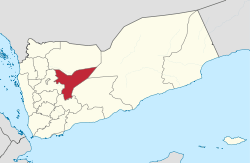Ma'rib Governorate
| Ma'rib مأرب | |
|---|---|
| Governorate | |
 | |
| Country | Yemen |
| Seat | Ma'rib |
| Area | |
| • Total | 20,023 km2 (7,731 sq mi) |
| Population (2011)[1] | |
| • Total | 288,000 |
| • Density | 14/km2 (37/sq mi) |

Ma'rib (Arabic: مأرب Maʾrib) is a governorate of Yemen. It is located 173 kilometers to the northeast of Yemen's capital, Sana'a. The population of Ma'rib Governorate comprises 1.2% of the country's total population. The city of Ma'rib is the capital of the governorate, and was established after the discovery of oil deposits in 1984.[2]
Ma'rib Governorate borders Al Jawf Governorate to the north, Al Bayda Governorate to the south, Shabwah Governorate to the southeast, Hadhramaut Governorate to the east, and Sana'a Governorate to the west. Ma'rib Governorate's area is approximately 17,405 square kilometers, divided among 14 districts. Ma'rib District is the biggest district by area.
Ma'rib's population in 2004 was 241,619.
Climate
The governorate's climate varies based on elevation. The mountainous and elevated regions, which make up the western half of the governorate, are dominated by a moderate climate with hot summers and relatively cold winters. In the low-lying and plain regions, the climate is hot in the summers and moderate in the winters. The desert regions are characterized by a dry climate: hot in the summers, and cold and dry in the winters.
Precipitation
Summer rains fall on most parts of the governorate, but the amount of rainfall is usually small, especially in the eastern parts. Most parts of Ma'rib Governorate suffer from drought, given the sparse rainfall.
Agriculture, Livestock, and Wild Animals
Agriculture
Agriculture is the main livelihood for the governorate's residents. Ma'rib Governorate ranks third in Yemen behind Al Hudaydah Governorate and Sana'a Governorate in terms of agricultural production, making up 7.6% of the country's total agricultural production. Its most important agricultural products are fruit, grains, and vegetables.
Vegetation
Vegetation in the governorate is diverse, despite its sparseness and lack of density in terms of quantity and quality from place to place, depending on the nature of the surface and prevailing climate. The most important trees are the Christ’s Thorn Jujube, the qard tree, the buckthorn, the acacia, and the umbrella thorn acacia, as well as some thorny trees. There are also many types of grasses and small plants that grow in the rainy seasons.
Livestock
Many types of livestock are found in Ma'rib Governorate, including cattle, camels, sheep, goats, donkeys, and poultry. There are also quite a number of beehives. According to statistics for the time period 2007-11, the governorate was home to approximately 1,943,564 sheep, approximately 1,669,370 goats, roughly 42,000 cattle, and about 112,782 camels, which make up 3.80% of Yemen’s total livestock.
Wild Animals
Many types of wild animals are present in the governorate, and are plentiful in the western areas, including tigers, hyenas, snakes, lions, wild rabbits, hedgehogs, and hyraxes.
Birds include falcons, wild pigeons, eagles, and owls. The birds are numerous in areas dense with trees, as well as near wadis, especially those with water.
Mineral Wealth
The most important minerals found in the governorate are granite, alaschoria, rock salt, gypsum, marble, and talc. Ma'rib was the first governorate in Yemen where oil was discovered, and production began in 1986.
Ma'rib is home to the largest gas-fired power plant in Yemen, the Ma'rib Gas Plant, whose electricity towers have been sabotaged continuously since the beginning of 2011. These sabotage operations did not stop until 2014, due to the inability of the Basindawa government to deter the saboteurs.
Population
The total number of residents living in the governorate was 238,522 according to the 2004 census, and the rate of growth was 2.72%. According to 2009 projections, the population grew to approximately 271,855.
Districts
- Al Abdiyah District
- Al Jubah District
- Bidbadah District
- Harib District
- Harib Al Qaramish District
- Jabal Murad District
- Mahliyah District
- Majzar District
- Marib District
- Marib City District
- Medghal District
- Raghwan District
- Rahabah District
- Sirwah District
References
- ↑ "Statistical Yearbook 2011". Central Statistical Organisation. Retrieved 24 February 2013.
- ↑ United States Army Training and Doctrine Command (February 2010). "Yemen Smart Book" (PDF). Cryptocomb. p. 179. Retrieved 27 May 2012.
Coordinates: 15°27′N 45°20′E / 15.450°N 45.333°E
